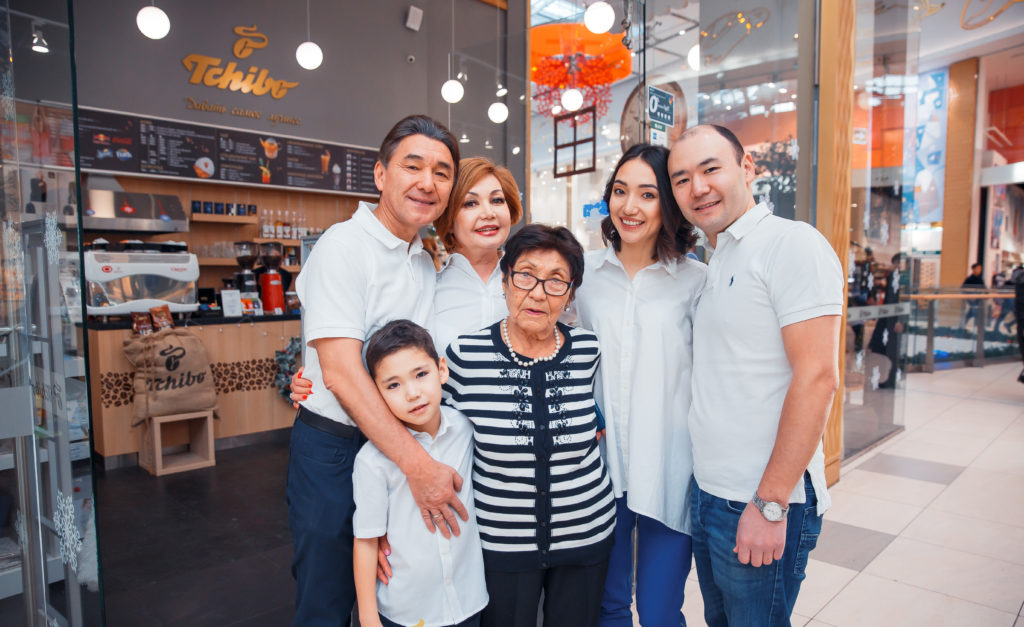NUR-SULTAN – Tchibo Kazakhstan has opened its unique three-in-one model of coffee and coffee machines/home goods/coffee shops in the capital and Almaty. The company promotes family business values and is moving towards sustainable retailing.

L-R: Serik Irsaliyev and Saniya Irsaliyeva, Kanipa Nurgalieva, Kamilya Serikova and her spouse Iskakov Adilkhan and their son Amirkhan Nurakhmetov.
Co-founder Kamilya Serikova, who lived in Europe for 12 years, started the business with her mother Saniya Irsaliyeva and sisters Leila Irsaliyeva and Aizhan Iskakova upon returning home. Although she initially doubted the possible success of a family business, she learned during an internship in Germany that 80 percent of local enterprises are family-owned businesses which have existed for 200–300 years.
“The board of directors of family-owned businesses in Germany consists not only of people from the family and they also play decision-making roles. I guess this is the secret to the success of their business,” she said in an interview for this story.
They wanted to create a cosy European-style café in the heart of Central Asia and show locals a new way of family shopping.
“There’s a stereotype that if there’s a high-quality item, it must be expensive. As a student, I always purchased gifts for my relatives and friends at Tchibo store, as they offered good products at affordable prices. Then we got an idea to open a coffee shop in Kazakhstan to offer quality goods and quality coffee,” she said.
Working with their partners, the company was able to open its first coffee shop Oct. 12, 2018.
“When we conducted market research, at that time none of the coffee shops in Kazakhstan used 100-percent Arabica coffee beans. Tchibo uses only 100-percent Arabica coffee beans, which are grown at high elevations. It is difficult to plant, care and harvest this sort of coffee bean but it is considered to be of high quality and better for health, as it has a smaller percentage of caffeine than Robusta. Arabica is considered to have a bitter taste, but, in fact, the Tchibo company uses special slow roasting. Due to this fact, a very mild taste is obtained,” she noted.
Tchibo developed a menu taking into account local lifestyle. The café offers not only desserts, but also snacks and children’s drinks. There’s a kid’s table with toys and colouring books at the coffee shop in MEGA Silk Way in the capital and MEGA Centre Alma-Ata in Almaty.
The company originally focused on the family concept, but when it opened a shop, it realised its customers were more kinaesthetic.
“People like our organic cotton, especially men,” said Serikova.
The company uses organic cotton for clothing and household goods. Tchibo is also a distributor of organic cotton grown in fields where chemicals are not used.
“We mostly develop our business through business networking and personal branding. We attend various events, work with bloggers and organise various master classes in Tchibo. Users can purchase our items via Instagram. Delivery is free throughout Kazakhstan for purchases worth more than 15,000 tenge (US$40),” she said.
The company conducted market research and began cooperating with the European Bank of Reconstruction and Development (EBRD). It is now developing an online store with the bank’s support.
Tchibo plans to offer bean-to-cup coffee machines and expand its range of products. It also soon intends to supply coffee to other coffee houses, as its blends are becoming more popular among locals.
“We are for green business. Our suppliers also choose a conscious approach in production. We offer a 10-percent discount for customers with their own reusable cup for keeping one more cup out of landfields. We recycle paper and plastic,” she said.
“We are delighted to invite new customers to try our high-quality coffee and we are pleased to see customers returning to us. We are also open to proposals for cooperation; we are happy to receive feedback from our guests,” she added.
